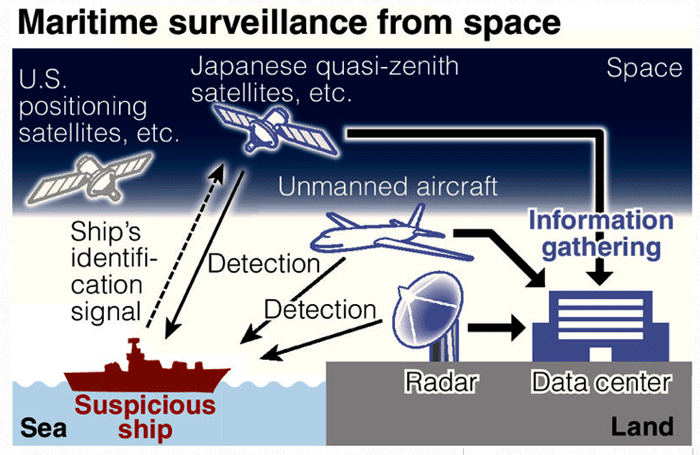.

The government has decided to create strategy guidelines for Japan on the use of space for security purposes, which would be comparable to the U.S. National Security Space Strategy (NSSS), The Yomiuri Shimbun has learned.
According to informed sources, Japan’s version of the NSSS will likely call for the strengthening of cooperation between Japan and the United States in the space field, including satellite-based maritime surveillance of China, which has been accelerating moves to utilize space for military purposes.
The government plans to compile the strategy document by the end of this year, so that it can be reflected in revisions to the Japan-U.S. defense cooperation guidelines that will be drawn up at year-end.
Japan’s NSSS is expected to include surveillance of space to detect suspicious satellites and floating space debris, as well as the development of a maritime surveillance system to monitor ocean and ships.
The strategy document will also likely stipulate that Japan and the United States will share data, collected by Japanese quasi-zenith satellites orbiting above areas from Japan to Australia and also by U.S. positioning satellites, as well as images taken by Japanese and U.S. information-gathering satellites, the sources said.
Late last month, the government set up a basic policy subpanel, under the Committee on the National Space Policy, staffed by experts who will decide the country’s space development policy. The subpanel plans to draw up Japan’s NSSS in cooperation with the National Security Secretariat, which is under the wing of the government’s National Security Council. An interim report on the strategy document is expected to be released in summer.
In May, the Japanese and U.S. governments affirmed the strengthening of cooperation in the space field during a meeting of the Japan-U.S. Comprehensive Dialogue on Space held in Washington.
The two countries are speeding up cooperation in the space field because the use of satellites and other space technology has become extremely important for military purposes. In modern combat operations satellites play indispensable roles, including detecting enemy forces with the help of ground radar and aircraft, and controlling precision-guided missiles.
China has been taking steady steps toward becoming a country with a strong space sector. In 2007, Beijing conducted an experiment to destroy a satellite with a missile. In December 2013, it successfully landed an unmanned probe on the moon.
According to observers, Japan wants to maintain the superiority of Japan and the United States in the space field with its planned NSSS. Some government officials expect an enhanced surveillance system using satellites will make it easier to identify Chinese military movements, which can be difficult to detect.
In May 2008, when the Basic Space Law was enacted, a ban on the use of space for defense purposes was lifted. The government then compiled a basic space policy in 2009. Japan’s NSSS will be the first strategy document drawn up by the government for the use of space for security purposes.
The United States has updated its NSSS every year since 2011 to promote the use of space for security purposes. With countries such as China in mind, the strategy says U.S. superiority in space is challenged more and more frequently and calls for the development of a comprehensive surveillance system in space
Quelle: The Japan News
5100 Views
